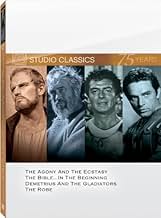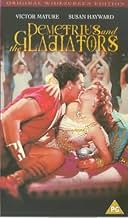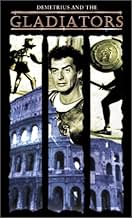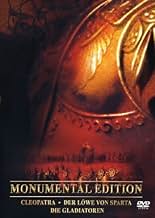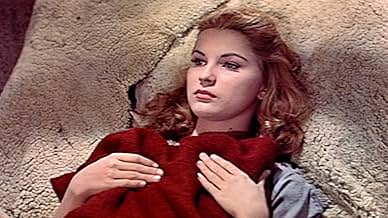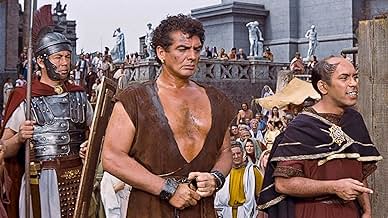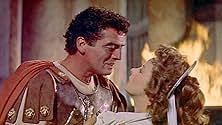Um escravo de força extraordinária é encarregado de proteger o manto que Cristo usou na cruz. Depois de ser capturado por Calígula, sua fé é testada quando ele é forçado a competições mortai... Ler tudoUm escravo de força extraordinária é encarregado de proteger o manto que Cristo usou na cruz. Depois de ser capturado por Calígula, sua fé é testada quando ele é forçado a competições mortais na arena.Um escravo de força extraordinária é encarregado de proteger o manto que Cristo usou na cruz. Depois de ser capturado por Calígula, sua fé é testada quando ele é forçado a competições mortais na arena.
- Soldier
- (não creditado)
- Gladiator
- (não creditado)
- Cousin
- (não creditado)
- Gladiator
- (não creditado)
- Varus
- (não creditado)
- Gladiator
- (não creditado)
- Guard-Escort of Prisoners
- (não creditado)
- Direção
- Roteiristas
- Elenco e equipe completos
- Produção, bilheteria e muito mais no IMDbPro
Enredo
Você sabia?
- CuriosidadesTwice jailed for drug use, Jay Robinson once had the dubious honor of being recognized by his fellow inmates when this film was played for the convicts.
- Erros de gravaçãoWhilst Caligula (Jay Robinson) is talking to Claudius and Messalina about the death of Marcellus and Diana, he draws a dagger and plays with Claudius by threatening to stab him with it. When he puts it back in its sheath, sheath and dagger inadvertently turn upside down sticking out at an odd angle and irritating Jay Robinson, who tries twice and finally rights the sheath at his waist.
- Citações
Demetrius: We traveled here together from Galilee, persuading people to give up their lives for a beautiful dream.
[he attempts to hand a goblet of wine to Peter]
Demetrius: Take it Peter. It's real... hot spiced, with cinnamon and cloves.
[chuckles and looks towards Messalina]
Demetrius: Did you know that Jesus could turn water into wine? And that was only one of his tricks.
Peter: Yes, only one. Anything that was base, He could make noble. He found a leper and made him clean. He found death and He made life. He found you a slave, and He made you free.
Demetrius: Get out!
Peter: And now you've won a great victory over Him, haven't you tribune ? You've made yourself a slave again.
- ConexõesFeatured in Poção do Amor Nº 9 (1992)
The central character, Demetrius, is a former slave who, after assaulting a soldier who is molesting his girlfriend Lucia, is sentenced to fight in the arena as a gladiator. This causes him difficulties as he is a Christian whose moral code will not permit him to kill another man, even in self-defence. He survives, however, largely because he attracts the attention of Messalina, the wife of Claudius, uncle of the Emperor Caligula. Later, believing that Lucia has accidentally been killed by another gladiator, Demetrius renounces his Christian faith, and fights fiercely, killing the man he believes to have been responsible for her death and several others. His courage and skill with a sword lead to his being made a tribune in the Praetorian Guard, and he becomes Messalina's lover. As in "The Robe", the robe which Christ wore to His crucifixion plays an important part in the film; Caligula wants to get his hands on it because he believes that it has magical powers and that it will give him the secret of eternal life.
Several of the epics of this period combined, incongruously, an improving religious message with a good deal of eroticism, with much bare female flesh on display- examples include "Solomon and Sheba", "Esther and the King" and "Salome", where we get to see the famous dance of the seven veils, but it is made clear that, contrary to the Biblical version of the story, Rita Hayworth's character is in fact a virtuous heroine who only is flashing her legs in public in a desperate attempt to save John the Baptist from his fate. There are elements of this strange combination of godliness and sexiness in "Demetrius", but the sexiness is very much downplayed. Messalina's notorious promiscuity is alluded to rather than shown on screen, and the scene between the gladiators and the women brought in to entertain them may be an orgy, but it is a very decorous one. The film-makers were clearly more interested in the element of godliness, and, unlike some films of this type, "Demetrius" raises genuine moral issues about pacifism, non-violence and Christian forgiveness.
Demetrius himself is a man who goes through a crisis of faith and abandons his Christian beliefs in favour of an ethic based on revenge and worldly ambition. His conscience, however, is troubled, especially after he is reproached by his old friend St Peter. He is a more complex and interesting figure than many epic heroes, so it is unfortunate that the part was played by Victor Mature, an actor whose success often seemed to owe more to his ruggedly masculine good looks and his virile physique than to his acting technique. Susan Hayward (an actress who could often look bored and listless when asked to play roles that did not interest her) makes a weak Messalina. Neither give their worst performance (in Hayward's case that must surely have been "The Conqueror"), and Mature brings a certain rough sincerity to his part, but I felt that the film might have been improved with other actors in these roles.
Nevertheless, there was much I enjoyed about the film. Michael Rennie was appropriately dignified as Peter, played as a sort of ascetic philosopher, although I would agree with the reviewer who pointed out that it would be hard to imagine him ever working as a fisherman. I also liked William Marshall as Glycon, the former African king now forced to fight as a gladiator, who befriends Demetrius. ("Spartacus", a better film than "Demetrius" although it owes something to it, also features a sympathetic black gladiator who befriends the hero).
Jay Robinson, who played Caligula, has been criticised by some reviewers for overacting, although I must say I liked his performance. Historians have doubted whether the real Caligula was actually insane, although he was undoubtedly cruel and eccentric, but in the context of this film he is definitely presented as a lunatic, a man who has literally been driven mad by power to the point where he believes himself to be a god. (Not even Hitler went that far). There is an interesting contrast with a modern epic, "Gladiator", in which Joaquin Phoenix plays another tyrannical Roman Emperor, Commodus, as a basically weak and insecure young man. Although Phoenix's performance works well in the context of that particular film, the way the role of Caligula was written called for something quite different- the sort of ranting, over-the-top performance which might be unfashionable now but would have been less controversial in the fifties.
Although the standard of the acting is mixed, I generally enjoyed the film. It does not reach the standard of the really great epics, such as "Spartacus" or "Ben-Hur", but it works well on the level of spectacle, with fine sets and costumes and some exciting scenes of gladiatorial combat, and has a more intelligent script than many epics. 7/10
- JamesHitchcock
- 5 de set. de 2006
- Link permanente
Principais escolhas
- How long is Demetrius and the Gladiators?Fornecido pela Alexa
Detalhes
- Data de lançamento
- País de origem
- Idioma
- Também conhecido como
- Demetrius, o Gladiador
- Locações de filme
- Empresa de produção
- Consulte mais créditos da empresa na IMDbPro
Bilheteria
- Orçamento
- US$ 4.500.000 (estimativa)
- Tempo de duração1 hora 41 minutos
- Proporção
- 2.55 : 1
Contribua para esta página



